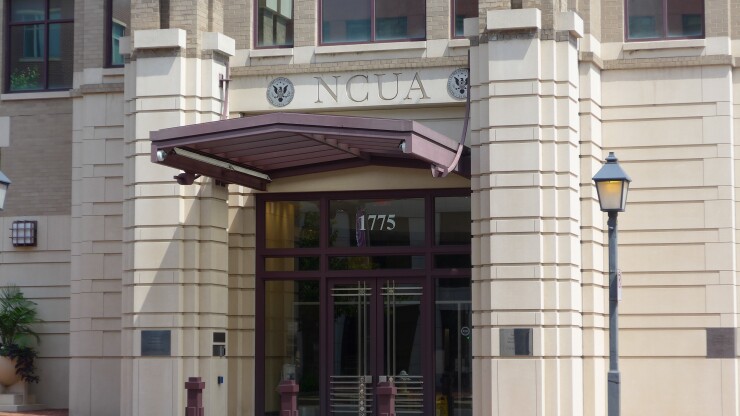
In response to the National Credit Union Administration's call for insight on climate-related financial risks, credit union advocates, insurance experts and other professionals are urging federal regulators to avoid implementing a formal rule.
Todd Harper, chairman of the NCUA, said in an earlier interview with American Banker that the board was deliberate in its issuance of an RFI — rather than an advanced notice of proposed rulemaking — to underscore its focus on data prior to the addition of new or modified regulations.
"What credit unions do today in terms of lending, services and products is much more diverse and sophisticated than it was back in the days when credit unions were really just offering personal loans and loans for new appliances. … We need to recognize that credit unions are part of a broader financial services ecosystem and have a role to play in it," Harper said. The agency declined to comment further pending the end of the comment period and the review of stakeholder comments.
With the severity of natural disasters increasing, the financial toll placed on individual credit unions and communities affected by events such as
Statistics from the
Many of the responses submitted to the NCUA offered detailed suggestions for tackling climate risks through the establishment of an insurance fund to support credit unions hit by natural disasters and added educational tools for developing risk-assessment models. But there was one common theme — rulemaking is not the answer.
Diana R. Dykstra, president and chief executive of the California and Nevada Credit Union Leagues, explained in her response to the RFI that compliance costs from staffing and new technology accompanying future rulemakings could be unfairly burdensome on institutions with smaller economies of scale.
Without any new requirements, member institutions of the Leagues have begun work on implementing sustainable practices into business plans such as environmentally focused lending products and collaborating with local green businesses, according to Dykstra. These responses, she said, showcase how credit unions are already moving in the right direction without formal mandates.
"Encouraging best practices, developing educational resources and facilitating dialogue can be far more effective in promoting climate resilience within the credit union sector than increasing an already heavy regulatory burden," Dykstra said in the letter.
Leaders at the helm of other trade groups such as the Ohio Credit Union League, the Dakota Credit Union Association and the League of Southeastern Credit Unions followed suit in recommending that the NCUA abstain from drafting new statutes on climate risk and instead opt for strengthening the system through added guidance and communication.
As an added resource for bolstering credit union operations in the wake of natural disasters, executives turn to
Ethan Aumann, senior director of environmental issues and resiliency for the American Property Casualty Insurance Association, explained how the market for insurance products geared toward underserved areas — which many credit unions lend into — is continually evolving and positions providers to help protect institutions and their members.
"Like other commercial clients, credit unions utilize property insurance products for protection from natural disasters and weather-related events. … In doing so, credit unions transfer risk they face onto the books of insurers," Aumann said. "Property casualty insurers are engaged in efforts to address long-term climate-related impacts and believe risk mitigation must continue to be a shared priority among governments, private industry and other stakeholders."
As the RFI's deadline passes, industry professionals with trade groups such as the Credit Union National Association continue to highlight the significance of local institutions and the experiences that can be lent to this issue.
"We think it's most appropriate for credit unions to be the ones taking the lead on this since they know their institutions best, their members best and … it's most important for the local credit unions at the location where they are to be the ones leading this effort," said Luke Martone, senior director of advocacy and counsel for CUNA.






